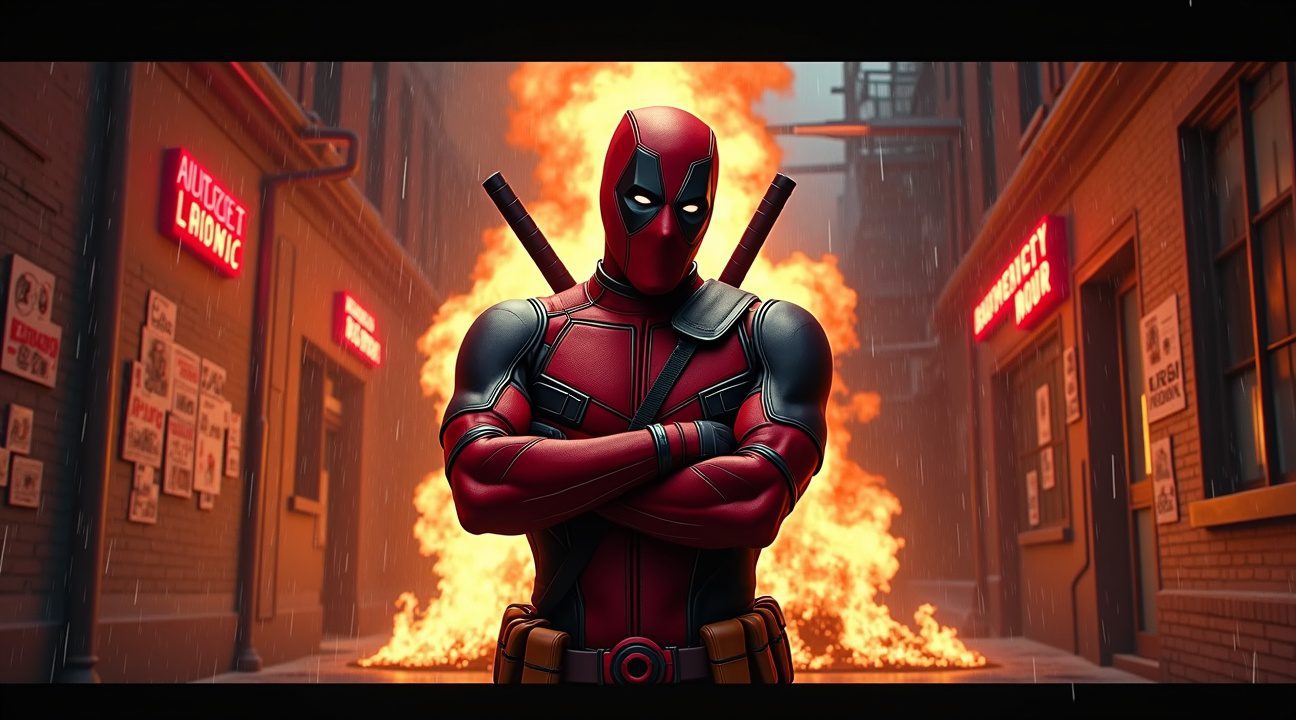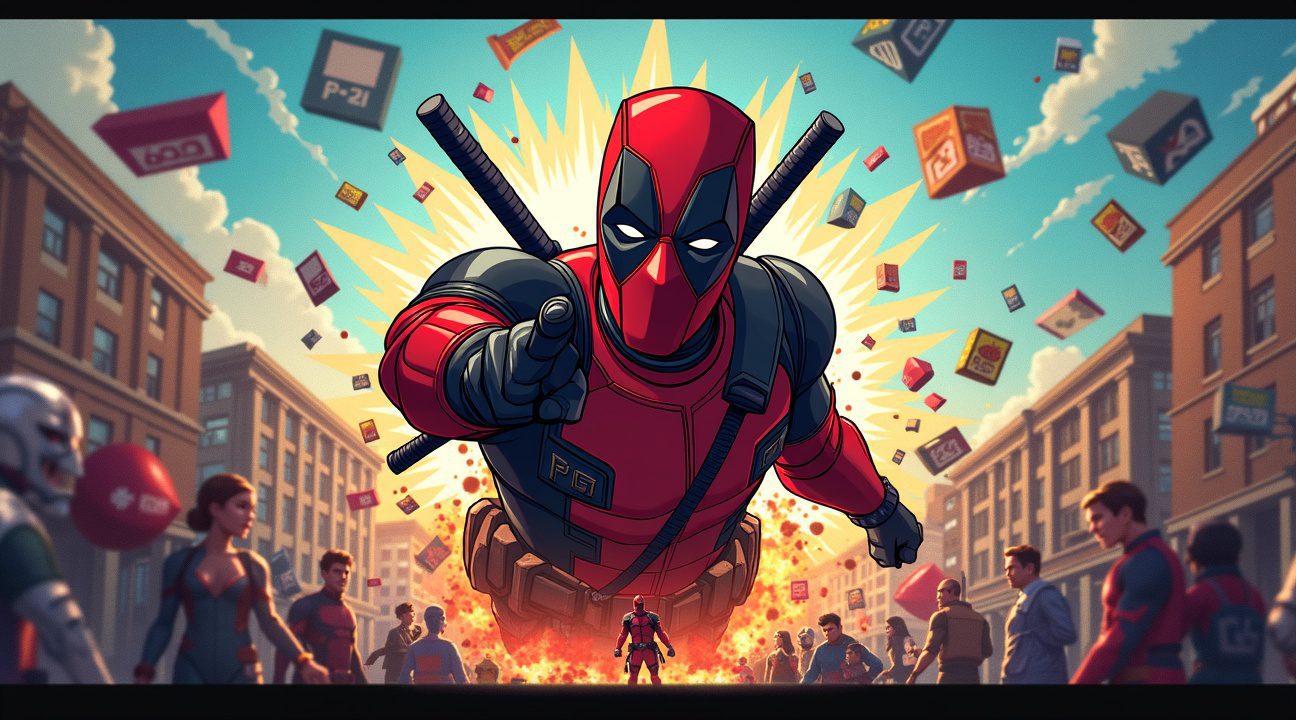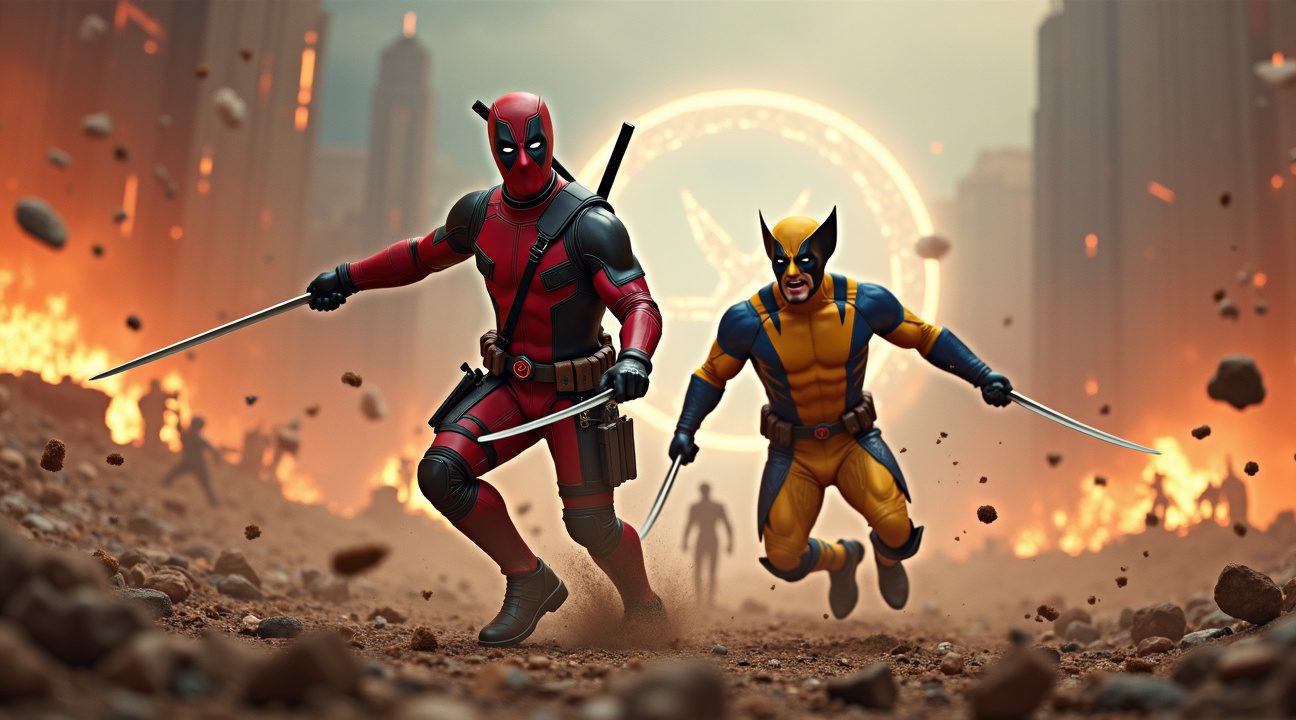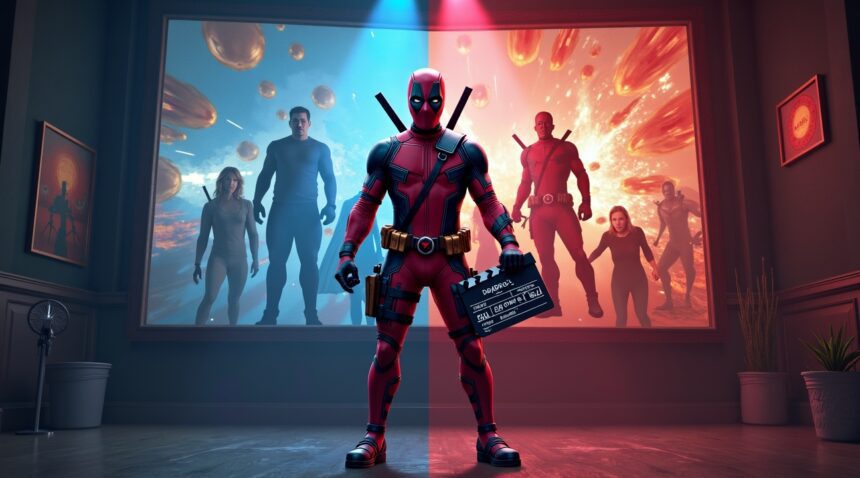Ryan Reynolds’ transformation into Deadpool represents one of Hollywood’s most passionate actor-character relationships, beginning with his advocacy for the role in 2004 and developing through decades of creative persistence.
His journey from the widely criticized portrayal in X-Men Origins: Wolverine to the record-breaking success of Deadpool & Wolverine demonstrates how authentic dedication to source material can reshape entire franchises and influence industry standards.
Key Takeaways
- Reynolds advocated for a faithful Deadpool adaptation since 2004, showing unwavering commitment that extended far beyond typical actor involvement in character development.
- The failure of X-Men Origins: Wolverine’s Deadpool portrayal motivated Reynolds to fight harder for comic authenticity, using early disappointment as fuel for future success.
- Deadpool revolutionized R-rated superhero cinema by grossing $782.6 million worldwide in 2016, proving mature content could achieve massive commercial success within the genre.
- The 2024 release of Deadpool & Wolverine broke box office records with $1.338 billion globally, becoming the highest-grossing R-rated film in cinema history.
- Reynolds successfully preserved Deadpool’s irreverent humor and fourth-wall-breaking characteristics during Disney’s MCU integration, maintaining creative integrity while adapting to new studio standards.
Origins and Early Struggles
Reynolds discovered Deadpool through the comic pages long before most actors even consider their superhero roles. The character’s irreverent humor and meta-commentary spoke directly to his comedic sensibilities. This connection transcended typical actor preparation. Reynolds saw himself in Wade Wilson’s wise-cracking persona.
X-Men Origins: Wolverine Disappointment
The actor’s first opportunity came with X-Men Origins: Wolverine in 2009. Studio executives stripped away everything that made Deadpool unique. They silenced the “Merc with a Mouth” and transformed him into a generic villain. Reynolds watched helplessly as his dream character became unrecognizable. The film’s critical failure stung, but it also strengthened his resolve.
Pushing for an R-Rated Vision
Reynolds refused to abandon his vision. He spent years developing a proper Deadpool script with writers Rhett Reese and Paul Wernick. Studios repeatedly rejected their R-rated pitch. Executives couldn’t envision a foul-mouthed, violent superhero film succeeding at the box office. Reynolds continued pushing forward despite constant rejection.
Turning Point: The Leaked Test Footage
The breakthrough came through unconventional means. Test footage leaked online in 2014, generating massive fan enthusiasm. Social media exploded with demand for a full Deadpool film. Fox executives finally greenlit the project, though they kept the budget relatively modest at $58 million. Reynolds had finally earned his chance to portray Deadpool authentically.
The Deadpool Era Begins
Deadpool’s Record-Breaking Debut
Deadpool’s 2016 release shattered expectations and industry assumptions. The film earned $782.6 million worldwide against its modest budget. Critics praised Reynolds’ performance and the film’s faithful adaptation of comic elements. Audiences responded to the character’s irreverent humor and direct acknowledgment of superhero tropes. The success proved R-rated superhero content could dominate mainstream cinema.
A Balanced Performance
Reynolds’ portrayal captured Deadpool’s essential characteristics perfectly. He delivered rapid-fire quips with impeccable timing. The actor embraced the character’s fourth-wall-breaking tendencies, addressing audiences directly. Reynolds also handled Deadpool’s emotional depth, particularly Wade Wilson’s relationship with Vanessa Carlysle. This balance between humor and heart elevated the character beyond simple comedy.
Deadpool 2: Expanding the Universe
The sequel, Deadpool 2, expanded the character’s world while maintaining the original’s spirit. Reynolds introduced Cable and Domino, building a broader X-Force narrative. The film earned $785.8 million globally, proving the first movie’s success wasn’t a fluke. Reynolds had established Deadpool as a major franchise player.
MCU Integration and Creative Preservation
Disney’s acquisition of Fox presented new challenges. The family-friendly studio needed to integrate an R-rated character into their Marvel Cinematic Universe. Many fans worried about potential censorship or character dilution. Reynolds negotiated carefully to preserve Deadpool’s mature content and irreverent tone. His involvement in development discussions proved crucial for maintaining authenticity.
Deadpool & Wolverine: An R-Rated Triumph
Deadpool & Wolverine marked a significant milestone for both characters and the MCU. The 2024 film brought Hugh Jackman back as Wolverine, fulfilling years of fan requests for their team-up. Reynolds crafted a story that honored both characters while introducing Deadpool to the MCU continuity. The film’s $1.338 billion global gross validated Disney’s decision to maintain the character’s R-rating.
Legacy and Industry Impact
Reynolds’ success with Deadpool extends beyond financial metrics. He demonstrated how actor passion and creative persistence can reshape major franchises. The character’s popularity influenced other studios to consider R-rated superhero content. Reynolds proved that authentic character portrayal resonates more than generic, committee-designed heroes.
Beyond the Films
The actor’s commitment to Deadpool continues expanding into new projects. Reynolds maintains active involvement in all character-related decisions. He’s developed animated series, video games, and merchandise that preserve Deadpool’s unique voice. Each project reflects his deep understanding of what makes the character special.
Conclusion
Reynolds transformed a relatively obscure comic character into a billion-dollar franchise through sheer determination and creative vision. His two-decade journey from initial discovery to MCU integration showcases how authentic passion can overcome industry resistance. Deadpool’s success story proves that staying true to source material and character essence creates the strongest foundation for lasting franchise success.
The actor’s relationship with Deadpool exemplifies perfect casting when performer and character align completely. Reynolds didn’t just play Wade Wilson; he became him. This transformation created one of modern cinema’s most successful actor-character partnerships and redefined what superhero films could achieve.
Ryan Reynolds Becomes Synonymous with Deadpool Through Creative Passion and Comic Authenticity
Ryan Reynolds’ journey with Deadpool began long before audiences witnessed the character’s faithful big-screen debut. His first encounter with Wade Wilson came in 2009’s X-Men Origins: Wolverine, a portrayal that would ironically fuel his determination to deliver a more authentic version of the Merc with a Mouth.
Early Disappointment Sparked Greater Determination
The X-Men Origins: Wolverine version of Deadpool drew harsh criticism from fans, primarily because it fundamentally misunderstood what made the character special. Most controversially, the film sealed Deadpool’s mouth shut, effectively silencing the character’s signature wit and breaking the fourth wall commentary that defines him. Reynolds himself recognized this misstep and understood why fans felt betrayed by the adaptation.
This early failure didn’t discourage Reynolds—it motivated him. He’d been advocating for a faithful Deadpool adaptation since 2004, demonstrating a commitment that stretched far beyond typical actor involvement. His passion wasn’t just professional; it was personal. Marvel Comics had already drawn the connection between Reynolds and Deadpool in Cable & Deadpool #2, where writers described Deadpool as “Ryan Reynolds crossed with a shar-pei.” This comic reference highlighted how perfectly Reynolds embodied the character’s essence, even before he officially took on the role.
Fighting for Comic Authenticity
Reynolds understood that Deadpool’s appeal lay in his self-aware nature, dark humor, and moral ambiguity. Unlike traditional superheroes, Deadpool operates in gray areas, making jokes about his own fictional existence while dealing with genuine trauma and loss. Reynolds fought to preserve these qualities, knowing they were essential to the character’s identity.
His advocacy went beyond simply wanting to play the role again. Reynolds championed the aspects that made Deadpool unique in the Marvel universe:
- The character’s ability to break the fourth wall
- His irreverent humor
- His willingness to acknowledge the absurdity of superhero conventions
He recognized that sanitizing these elements would rob Deadpool of everything that made him compelling.
The actor’s persistence paid off when leaked test footage in 2014 generated massive fan enthusiasm, proving there was genuine demand for a faithful adaptation. This grassroots support, combined with Reynolds’ unwavering commitment, finally convinced studios to greenlight a proper Deadpool film. His dedication ensured that Deadpool’s future films would honor the source material rather than compromise it for broader appeal.
Reynolds’ approach to Deadpool demonstrates how actor passion can shape character legacy. He didn’t just want to wear the costume; he wanted to embody everything that made Wade Wilson special. His understanding of comic authenticity, combined with his natural comedic timing and willingness to embrace the character’s unconventional nature, created a perfect storm for success.
The transformation from the problematic X-Men Origins version to the beloved standalone films shows how Reynolds learned from early mistakes. He used that initial disappointment as fuel to ensure future portrayals would capture Deadpool’s true spirit. His advocacy for maintaining the character’s darkly comedic tone, self-awareness, and moral complexity became the foundation for everything that followed.
Through years of persistence and creative vision, Reynolds didn’t just play Deadpool—he became the character’s greatest champion. His commitment to comic authenticity over commercial compromise ensured that Deadpool could transition to film while retaining the qualities that made him a fan favorite. This dedication has made Reynolds virtually inseparable from the character, creating a legacy built on genuine respect for the source material and understanding of what makes Deadpool truly special.

Breaking Box Office Records with an R-Rated Revolution
I witnessed something extraordinary happen in 2016 when Deadpool shattered every expectation Hollywood had for R-rated superhero films. The movie achieved unprecedented box office success, grossing $782.6 million worldwide against a modest $56.7 million budget. This incredible performance made it the highest-grossing X-Men film and positioned it as the ninth-highest-grossing film of the year.
Financial Triumph Against All Odds
Financial analysts couldn’t believe the numbers when they came in. Deadpool‘s net profit reached $317 million, making it the second most profitable R-rated comic book film, trailing only behind Joker. This success story proved that audiences craved something different from their superhero entertainment.
The 2018 sequel demonstrated that the first film wasn’t just a lucky break. Deadpool 2 earned $734.5 million worldwide and $318.5 million domestically, cementing the franchise’s commercial viability. These numbers spoke louder than any studio executive’s doubts about R-rated content.
Revolutionary Approach to Superhero Storytelling
What set Deadpool apart wasn’t just its box office performance – it was the complete revolution in how superhero stories could be told. The film’s blend of R-rated humor, meta storytelling, and Ryan Reynolds’s creative influence created something audiences had never experienced before.
Reynolds broke the fourth wall consistently, acknowledging the absurdity of superhero tropes while simultaneously embracing them. This approach allowed the character to comment on everything from budget constraints to studio politics, creating an authentic connection with viewers who were tired of formulaic superhero narratives.
The film’s success opened doors for other unconventional superhero projects. Studios began recognizing that audiences appreciated honesty, humor, and humanity in their larger-than-life characters. Deadpool proved that superhero films didn’t need to follow the same safe formula to achieve massive success.
Reynolds’s commitment to maintaining the character’s irreverent spirit throughout production became legendary. His willingness to fight for creative control, even when it meant taking financial risks, ultimately paid off in ways that surprised even the most optimistic projections. The actor’s dedication to authenticity resonated with fans who could sense the genuine passion behind every crude joke and self-referential moment.
This financial and creative breakthrough established a new template for R-rated superhero entertainment. The success demonstrated that mature audiences had been underserved by the genre, and that there was significant commercial potential in treating superhero stories with both respect and irreverence simultaneously.
From Cult Comic Character to Mainstream Phenomenon
Deadpool first appeared in New Mutants #98 (1990), created by Rob Liefeld and Fabian Nicieza as a villain who would later transform into one of Marvel’s most beloved antiheroes. I find it fascinating how this character’s journey from antagonist to cult favorite mirrors the unconventional path that would eventually lead to his cinematic success.
The Comic Foundation and Character Evolution
The original comic character established several key elements that would become essential to Deadpool’s identity. His irreverent tone, combined with a colorful supporting cast including loyal friend Weasel and roommate Blind Al, created a unique comic experience that broke traditional superhero conventions. These characters provided grounding for Deadpool’s chaotic energy while amplifying his humor through their reactions to his unpredictable behavior.
What sets Deadpool apart from other comic characters is his meta-awareness – his ability to break the fourth wall and acknowledge he exists in a fictional universe. This characteristic became central to his appeal among readers who appreciated the self-referential humor and commentary on comic book tropes.
Reynolds’ Vision for Screen Adaptation
Ryan Reynolds understood that bringing Deadpool’s comic authenticity to screen required preserving the character’s rogue humor and meta-commentary. His commitment to maintaining these core elements proved crucial when audiences had the chance to see two vastly different interpretations of the character.
The 2009 portrayal in X-Men Origins: Wolverine stripped away everything that made Deadpool special – his mouth was literally sewn shut, eliminating his signature wit and breaking the fundamental connection between character and audience. Fans rejected this version because it abandoned the very essence of what made Deadpool appealing in the comics.
Contrasting sharply with this failure, the 2016 and 2018 films demonstrated how narrative fidelity and authentic style could create massive audience appreciation. Reynolds’ dedication to honoring the source material while adapting it for modern cinema resulted in films that felt true to the comic experience. The success of these adaptations has paved the way for upcoming projects that continue this faithful approach.
The dramatic difference in reception between these portrayals illustrates a crucial lesson about comic adaptations: audiences can immediately recognize when filmmakers respect the source material versus when they try to force characters into conventional molds. Reynolds’ understanding of this principle transformed Deadpool from a misunderstood screen presence into a mainstream phenomenon that maintains its cult appeal.
Reshaping Superhero Cinema Through Innovation and Marketing
Deadpool fundamentally altered the superhero landscape by demonstrating that R-rated comic adaptations could achieve massive commercial success. The film’s box office triumph forced studios to reconsider their family-friendly formulas and embrace more mature storytelling approaches. This shift became even more pronounced after Disney’s acquisition of Fox, with Marvel Studios eventually greenlighting projects that pushed beyond traditional PG-13 boundaries.
Revolutionary Marketing Strategies
Reynolds and the marketing team crafted an unprecedented promotional campaign that treated audiences as active participants rather than passive consumers. The strategies included several groundbreaking elements:
- Viral social media campaigns that maintained Deadpool’s character voice across all platforms
- Unconventional trailers that broke the fourth wall and mocked traditional superhero marketing
- Interactive promotional materials that engaged fans through humor and surprise
- Reynolds’ personal commitment to staying in character during interviews and public appearances
This approach created a direct connection between actor and audience that extended far beyond the film itself. Reynolds didn’t just promote Deadpool; he became Deadpool in the public eye, blurring the lines between performance and reality.
Genre-Defying Innovation
The film’s irreverent humor and meta-commentary challenged every established superhero convention. Deadpool openly mocked genre tropes while simultaneously embracing them, creating a self-aware narrative that appealed to both comic book enthusiasts and mainstream audiences. The character’s fourth-wall breaking allowed for direct audience engagement that no previous superhero film had attempted.
Reynolds’ commitment to the character extended beyond the original film, with Deadpool 3 arriving by 2024 and continuing to push creative boundaries. His dedication to maintaining the character’s integrity while expanding its reach has influenced countless other projects within the genre.
The success of Deadpool proved that audiences craved authentic, unconventional storytelling within familiar frameworks. Studios began recognizing that breaking traditional molds could yield both critical acclaim and financial success. Reynolds’ approach to character development and marketing has since become a blueprint for other projects seeking to differentiate themselves in an increasingly crowded superhero market.
This innovation didn’t happen overnight. Reynolds’ journey to perfect the Deadpool character, including his recovery from the poorly received X-Men Origins version, demonstrated his unwavering commitment to honoring the source material while making it accessible to broader audiences. His success has opened doors for more experimental approaches within established franchises, proving that risk-taking can pay substantial dividends.
https://www.youtube.com/watch?v=Ye1jJD1lUjM

Deadpool Enters the MCU Era with Record-Breaking Success
Disney’s acquisition of Fox in 2019 marked a pivotal moment for Ryan Reynolds and his beloved character. The purchase brought Deadpool into the Marvel Cinematic Universe fold, creating unprecedented opportunities for the irreverent anti-hero to interact with established MCU characters while maintaining his signature R-rated edge.
Breaking Box Office Records in the MCU
Deadpool & Wolverine emerged as a cultural phenomenon when it hit theaters in 2024. The film’s performance exceeded all expectations, delivering several key achievements:
- A staggering $211.4 million opening weekend that shattered previous R-rated film records
- Global box office earnings of $1.338 billion, establishing it as the highest-grossing R-rated film in cinema history
- Successful integration of Deadpool’s irreverent humor with the broader MCU aesthetic
- Proof that mature content could thrive within Disney’s traditionally family-friendly Marvel framework
Reynolds’s collaboration with Marvel Studios president Kevin Feige proved instrumental in maintaining Deadpool’s authentic voice while adapting to MCU standards. Their partnership ensured the character retained his fourth-wall-breaking humor and adult themes without compromising the film’s accessibility to Marvel’s established fanbase.
The success of Hugh Jackman’s return as Wolverine added another layer of excitement for longtime X-Men fans. This reunion capitalized on the chemistry between Reynolds and Jackman that had been building since their first collaboration, finally giving audiences the Deadpool-Wolverine dynamic they’d been craving since the character’s botched introduction in X-Men Origins: Wolverine.
Reynolds’s ability to navigate the transition from Fox’s more permissive creative environment to Disney’s structured approach demonstrated his understanding of both the character and the business. He successfully advocated for maintaining Deadpool’s edge while finding ways to make the content work within Marvel’s broader storytelling framework.
The film’s record-breaking performance validated Disney’s decision to preserve Deadpool’s R-rating rather than diluting the character for broader appeal. This approach proved that mature superhero content could coexist with Marvel’s traditional offerings, potentially opening doors for other adult-oriented characters within the MCU.
Wolverine variants and multiverse elements introduced in the film further expanded storytelling possibilities while honoring the character’s Fox-era legacy. These creative choices allowed Reynolds to acknowledge Deadpool’s history while positioning him for future MCU adventures.
The commercial triumph of Deadpool & Wolverine established Reynolds as a key player in Marvel’s future plans. His proven ability to deliver both critical acclaim and box office success made him an invaluable asset for the studio’s continued expansion into mature content.
Reynolds’s journey from advocating for the character’s first solo film to becoming a cornerstone of Disney’s Marvel empire illustrates his persistence and creative vision. His contributions to comedy and superhero cinema have earned industry recognition while cementing Deadpool’s place in pop culture history.
The character’s continued viability post-Fox acquisition demonstrates that authentic creative passion can transcend corporate changes. Reynolds’s unwavering commitment to Deadpool’s core identity ensured the character’s smooth transition into the MCU while maintaining the qualities that made him special in the first place.

The Legacy Continues with Future Marvel Prospects
Reynolds’s dedication to the Deadpool character shows no signs of slowing down as speculation swirls around the franchise’s future in the Marvel Cinematic Universe. Industry insiders suggest that Deadpool 3 won’t mark the end of Wade Wilson’s story, with discussions already circulating about potential Deadpool 4 and additional sequels that could expand the character’s presence across multiple MCU phases.
Box Office Dominance Sets the Standard
The financial success of Deadpool films consistently surpasses most traditional MCU entries, establishing a clear benchmark for what audiences crave in superhero entertainment. Each installment proves that R-rated content can thrive within the Marvel ecosystem, generating revenue numbers that rival even the most established MCU properties. This commercial performance validates Reynolds’s original vision and demonstrates that unconventional approaches to superhero storytelling can yield extraordinary results.
The character’s ability to break the fourth wall while delivering genuine emotional moments creates a unique viewing experience that keeps audiences returning for more. Reynolds’s collaboration with Hugh Jackman further amplifies this appeal, bringing together two beloved characters in ways that traditional superhero films rarely attempt.
Cultural Impact Beyond the Screen
Deadpool’s influence extends far beyond box office numbers, reshaping how studios approach superhero content across the entire genre. The character’s meta-humor and self-aware commentary have inspired other filmmakers to experiment with tone and narrative structure, leading to more diverse storytelling approaches within the superhero space. This ripple effect demonstrates how Reynolds’s passionate advocacy for authentic character representation can transform entire industry standards.
The introduction of new character variants continues to expand the Deadpool universe, creating opportunities for fresh storylines while maintaining the irreverent spirit that defines the franchise. These additions showcase how the character can evolve without losing the core elements that made him a cultural phenomenon.
Reynolds’s journey from advocating for Deadpool in 2004 to overseeing a billion-dollar MCU franchise represents more than just career success—it embodies the power of persistent creative vision. His transformation from a relatively unknown comic book enthusiast to an award-winning entertainment figure illustrates how authentic passion projects can evolve from niche comic book origins into mainstream cultural phenomena.
The actor’s commitment to preserving Deadpool’s authentic voice while adapting to MCU standards creates a template for how unconventional characters can thrive within established franchises. This balance between creative integrity and commercial viability positions the character for sustained success across multiple future projects.
Marvel Studios recognizes the unique value that Deadpool brings to their expanding universe, with Kevin Feige and other executives expressing enthusiasm for the character’s continued integration into larger MCU storylines. This institutional support, combined with Reynolds’s unwavering dedication to the role, suggests that Deadpool’s legacy will continue growing for years to come.
The evolution from Reynolds’s initial 2004 advocacy to today’s MCU integration demonstrates how persistence and creative vision can overcome industry resistance. What began as one actor’s determination to bring an obscure comic book character to life has transformed into a franchise that influences storytelling approaches across the entire superhero genre, proving that authentic passion projects can achieve both critical acclaim and commercial success when given the proper support and creative freedom.
https://www.youtube.com/watch?v=Z4GzvLzx1ew
Sources:
Screen Rant – “Deadpool’s Complete X-Men & MCU Timeline Explained”
Wikipedia – “Deadpool (film)”
TIME – “What to Remember Before Watching Deadpool & Wolverine”
The Numbers – “Deadpool & Wolverine (2024) – Box Office and Financial”
Box Office Mojo – “Deadpool v. Deadpool”
Wikipedia – “Deadpool”
Rotten Tomatoes – Editorial: “Deadpool & Wolverine Is Officially the Highest-Grossing R-Rated Film”


